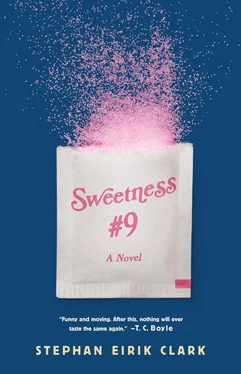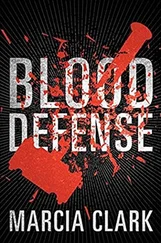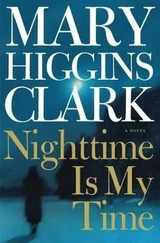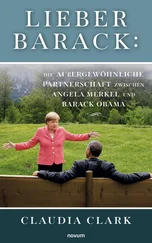“Why would you say that, Beekley?”
He just gave me a look.
“What are you?” I said. “A member of the Sweetness #9 Action Network? One of the Widows of Sugar Hill?”
“The Widows of Sugar Hill? David, I’m a life-long bachelor, you know that.”
“What do you expect me to think, Beekley?” I pointed at the face of the envelope. “It’s blank, meaning it was hand-delivered. It’s here, you’re here. The only way it could more obviously be your work is if you called me up to whisper, ‘It’s coming from inside the house.’”
“When a Stranger Calls,” Beekley said with an appreciative smile.
Koba looked between us, confused.
“The movie,” Beekley explained.
“Is that the one with Dustin Hoffman? About divorce?”
“It’s about a babysitter who receives threatening phone calls from a crazed killer,” I said, still looking directly at Beekley. “The police trace the calls to inside the same house.”
“Oh my. That’s terrifying,” Koba said.
Beekley nodded, suddenly very excited. “The horror genre in many ways defined life in the nineteen seventies. You have to understand: after Vietnam and Watergate, we were a country horrified by what we had become, so we washed ourselves in the blood of The Texas Chainsaw Massacre and Halloween and Friday the 13th, needing to feel the catharsis of these on-screen atrocities before we could be reborn into the feel-good movies of the Reagan Years. Porky’s, Weird Science, Stripes. Have you seen Weird Science ? Write that down. If you rent five movies for five nights, it’s only five bucks.”
I stood there like a ghost, my voice barely a whisper. “So did you? You have to tell me, Beekley. Are you behind this?”
He only then remembered the envelope in my hand. “What? No! You think someone’s stalking you because of what you know or did? That maybe this is the prelude to extortion or violence?”
It was so terrifying to hear these thoughts coming from outside my own head. I nodded.
Beekley went into the fridge for a canister of pressurized orange cheese and spoke while sending bursts of it into his mouth. “You ask me, it could be the work of the GLF.”
“The GLF?”
“The Gastrophilic Liberation Front,” he said, before his voice became more nasal. “Le Front de Libération Gastrophilic. They’re slow-fooders based out of Quebec, active since nineteen eighty-seven, and most recently linked to attacks on food production facilities in two provinces and three states. Vicious group, absolutely brutal. I’ve even heard chatter online that suggests they’re assembling a children’s martyrs’ brigade.”
“You’ve got to be joking.”
“Joking? Do you also want to tell me the organic food movement doesn’t have a paramilitary wing? Who’s the one being naïve here, David?” He squirted more cheese into his mouth. “You could be one of a dozen or more flavorists getting these packets of sweetener in the mail. The Nine doesn’t have the best reputation, you know. I’ve got friends who rate it just a cut above Agent Orange.” He pointed to the front of the building. “Dreadlocked men could burst through these doors at any minute, holding semi-automatic weapons they’ve cleaned with organic vegetable oil.”
He rattled on like some excitable professor, speaking of abortion doctors stalked by pro-lifers and animal research facilities that had been ransacked by masked activists. He knew of a nuclear physicist who’d been blinded by battery acid, and a scientist with the CDC whose work with measles, mumps, and rubella vaccines had so enraged the mothers of autistic children that the government had offered him the use of a new name.
“And you think this could be something like that?”
He squirted more cheese into his mouth, nodding.
I wanted to take a knee. “So what should I do? Call the postmaster general?”
“Please. A man who deals in lost mail?”
“What, then?”
He put the cheese back into the fridge, telling me it wasn’t too late for us to buy a gun safe. He pointed to the space beside the soda machine. “There’s plenty of room.”
Koba smiled hopefully. “I’m sure it’s probably nothing.”
Then Beekley reached into a drawer and came over to me with a Ziploc bag. “You better put that in here,” he said. “You don’t want to tamper with the evidence any more than you already have.”
I took the side streets home, wanting to remain in motion, my destination forever deferred. Then as I was driving through South Battle Station I saw two large words — SECURITY CAMERAS — painted in red on the side of a white windowless building, and I made a U-turn and parked alongside the door.
A tired-eyed man stood at the front counter, scratching at his side. He wore faded blue jeans and a black T-shirt that didn’t quite cover all of his belly. Slump-shouldered, and with thinning hair and a two-day beard, he’d probably looked forty-three since he was seventeen.
“How can I help you?” he said, with breath that would’ve announced his presence to a blind man.
“I’m a local business owner,” I told him, this story springing from me fully formed, “and in the last week I’ve become the target of vandals. Graffiti and the like. The worst vulgarities.”
“Kids,” he said. “They got no moral compass anymore.”
“That’s right. But I thought if I had a camera fixed to the side of my building”—already he was nodding—“I’d scare them away or at least be able to take some hard evidence to the police.”
The man held up a finger, then stepped over to a neighboring display unit and slid open its back panel and reached inside for a box.
“This is The Eagle Eye.” He set it down between us. The cover of the box had a photo of a sleek CCTV camera on it. “Top of the line, unrivaled functionality, tamper proof. It’ll pan, tilt, zoom, give you night vision technology, you name it. If I were Saddam Hussein, this is the one I’d buy.”
“And the cost?”
“Seventeen forty-nine.”
“Seventeen dollars?”
“Seventeen hundred.”
A moment, then, “Do you have anything else?”
The next one he showed me came in a larger box.
“This is The Hawk,” he said. “She’ll give you six hundred lines of resolution at distances of up to two hundred feet, one hundred at night. Tamper proof; you don’t worry about the wind and the rain. I sell a lot of these.”
“It looks bulky.”
“Bulk scares the bad guys.”
I told him I might have misspoken. “I’m more interested in catching someone in the act.”
“I like your style.” He stepped away again, then returned with a third box, on the cover of which was a picture of a halved orb made of darkened glass. “This is The Invisible Eyeball.”
“That’s quite a name.”
“It’s quite a system. Sleek, doesn’t mar the sight lines. You just pop her up there on the wall and people think it’s a motion-sensitive light. It’s a bargain at three hundred bucks.”
“Does that include installation?”
“Installation is extra. As is a power source and recording equipment.”
“I’ve got a spare VCR. Would that be sufficient?”
“Only if you want to replace the tape every six hours. This one here”—he walked me over to a neighboring display unit, where a massive black VCR-like machine sat on the top shelf—“this is the T1-60. You can slide a tape in there, go to the Bahamas for forty days, have a mai tai, look at the pretty girls, then come back and you don’t miss a thing. That’ll get you nine hundred hours of full-day real-time results on a single cassette. I wouldn’t even try to sell you anything else.”
Читать дальше












